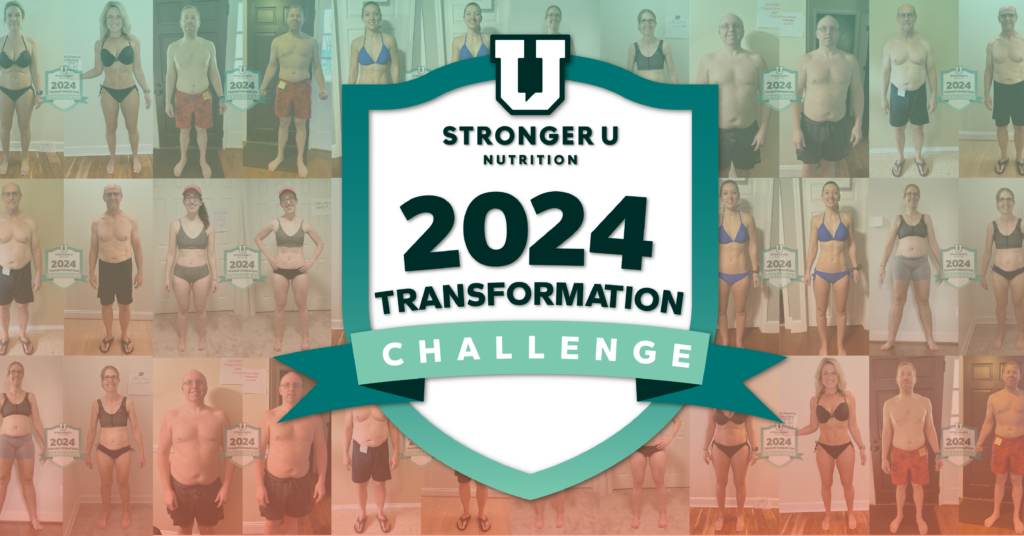It’s that time again, SU’ers! Each and every month the Stronger U Staff gets together so that we can all take a deep dive into current research together, led by our very own Dr. Jessica Bachman. We like to do this as a way for all of us to stay up to date on all of the various things that can go into helping our clients see the results they want, but it also just provides another opportunity for each of us to learn together, helping build our team.
We love being able to invite you behind the curtain so that you can see what it is that we’re working on as a company, what we’re learning about as coaches, and how those lessons that we’re learning can apply to you, our Members. In the past, we’ve done these Journal Clubs to learn more about things like diet breaks, coaching skills like Motivational Interviewing, and fueling for endurance exercise. This month, we talked about one of everybody’s favorite things!
What was the topic we learned about?
This month the Stronger U Staff learned all about sleep. You know, that thing that we never want to do when we’re kids? Or that other thing that we can’t get enough of when we’re adults? Yeah, that really important thing that far too many of us neglect on a daily basis, sleep. Dr. Jessica Bachman and Coach Jorden Pagel led us through the journal club this month. Together, they helped us understand:
The physiological underpinnings of sleep. Not just understanding that it’s important that we sleep every night, but understanding why it’s important that we sleep every night. Specifically, adequate sleep has a major impact on the health of our hormones. When we’re sleeping enough and regularly, the fine-tuning nature of our hormones tends to be much more in check. Whereas when we’re chronically underslept, that can be something that regularly wrecks our testosterone, ghrelin, leptin, and other hormones that govern our metabolism and influence our decision making.
But learning about sleep in a somewhat abstract concept wasn’t the only way we learned about sleep. After all, the whole point of these journal clubs is a chance for us to look at a specific piece of research as a team to see what kind of takeaways we might be able to glean together, and this month was a great example of doing just that.
What was the study we went over?
Insufficient sleep undermines dietary efforts to reduce adiposity – Annals of Internal Medicine.
What were the things that went on in this study?
The overall goal of the study from the researchers was to find out if a reduction in sleep impacted fat loss in a calorie controlled diet. In order to find this out, researchers took a group of 10 subjects who spent 14 days in a sleep lab.
All of the subjects had to fit the following criteria:
- Sedentary
- Non-smokers
- A BMI between 25-32
- Sleep on average between 6.5-8.5 hours per day
This criteria also means that individuals who work physically demanding jobs exercise regularly, take naps regularly, drink excessive alcohol or caffeine or take certain meds were all excluded from participating.
What happened?
Researchers set up two groups, those who spent 8.5 hours in bed each night, and those who spent 5.5 hours in bed each night. This study was a random crossover design, which means that all of the subjects equally took part in both the 5.5 hours of time in bed and the 8.5 hours of time in bed.
Each group of subjects started the study by spending two days sleeping about the normal amount they typically do, which is about 7 hours. Following that two day period where researchers were taking baseline tests and measurements to try and establish a control, the subjects were split up to either:
- Spend 14 days with an average of 8.5 hours of time in bed each night
- Spend 14 days with an average of 5.5 hours of time in bed each night
After that 14 day period of observation, subjects then spent two more days in the lab with the same amount of time spent in bed as they had been during their 14-day observational period. There was a follow-up battery of tests done to compare against those same tests performed in the first two days when subjects were sleeping what equated to a normal amount.
Following the above period, subjects were then sent home for 3 months, brought back, and randomized into the opposite group than the one they were in previously. So subjects that had previously been in the 8.5 hours time in bed group were now in the 5.5 hours group, and vice versa.
During this study, all subjects were eating a calorie controlled diet equating to 90% of their required food intake, based off of their RMR, or resting metabolic rate. Additionally, subjects rated their hunger on what’s called a 100mm visual analog scale before each meal to create a 24-hour hunger score by taking an average of their typical scores.
What were the results?
Each group ate an almost identical amount over the course of the study. The 8.5 hour time in bed group averaged 1,447 total calories per day, whereas the 5.5 hour time in bed group averaged 1,450 total calories per day. The macronutrient breakdown of those calories was:
- 48% carbs
- 34% fat
- 18% protein
Overall body weight change between the two groups was the same, but the really interesting takeaway for a lot of us in looking at this study wasn’t that the overall change in weight was the same — it was where that change in weight came from.
The group that spent 5.5 hours in bed lost on average 55% less body fat than the group that spent 8.5 hours in bed. Additionally, that 5.5 hours in bed group lost 60% more fat-free mass than the group that spent 8.5 hours in bed. Which means that the group who slept less may have lost a similar amount of weight, but where that weight came from wasn’t the same at all.
Additionally, the group that spent 5.5 hours in bed reported:
- Increased hunger over a 24 hour period
- Higher fasting and post-prandial RQ (which just means that this group was burning more carbohydrate for energy vs. fat, which might partially explain why there was less fat loss)
- Higher levels of ghrelin, which are associated with increased hunger and food intake as well as more body fat retention.
- Lower resting metabolic rate
What does this matter for you?
Hopefully, you weren’t someone who was in serious need of being convinced of just how important sleep actually is, but just in case you were, I hope this has done the trick. Because put simply, sleep makes everything easier. At seminars that I do with Coach Josh Citron and Dr. Jessica Bachman we’re all fond of talking about how if we can change one single thing for any single person there, the one thing we want to fix is the quality and quantity of their sleep.
Why? Well, not to burst your bubble, but it doesn’t have to do with the fact that we’re desperately concerned with you getting your beauty rest, though there is that. It’s that getting in enough sleep is going to be a hallmark of making sure that you’re making a lifestyle change as reasonable and manageable as possible for you.
Getting adequate sleep is one of the simplest and most effective things you can do when it comes to controlling your overeating, and especially impulsive overeating. Getting adequate sleep is a way that you can prime your body for on-point decision making for the rest of the next day, and the more of those kinds of days you can string together, the more you make progress. Sleep is an integral piece of that.
On top of that, as we’ve seen from the research we went over, getting adequate sleep is heavily tied to seeing success from a fat loss point of view as well. If you’re someone with body composition goals, someone who is focused on performance in the gym, or something similar, then it’s safe to say that sleep very well could be the missing link. Many of us like to wear our lack of sleep lack a badge of honor, thinking that because we’ve simply gotten used to what it feels like to be tired all the time that somehow means that we don’t actually need sleep. But in reality, that’s a recipe for running into the wall at some point or another. Because a lack of sleep can be something we can get away with for a period of time, but not forever. At some point or another, your body will let you know that it’s in need of rest.
How can you improve your sleep?
Improving the quantity and quality of sleep that we get is one of the great challenges of adulthood. The various responsibilities, obligations, and schedules that we all live by are going to play a major role in determining just how much sleep we’re able to get on most days. However, that being said, there are a few common suggestions that do play a major role in allowing us to get both more sleep, but higher quality sleep as well.
Set a normal schedule.
This goes for both a normal wake up time and a normal bedtime. Finding a way to start going to bed and waking up at the same time is a valuable skillset since we typically do respond well to that sort of routine. Additionally, by setting hard limits on when you go to bed and when you get up, you make it easier to try and control the amount of sleep you’re getting on a nightly basis. So you might not always be able to get 8.5 hours a night like the subjects in our study, but by working on your own schedule, you might make it easier to get 7 or 7.5 hours.
Create a nighttime routine.
Routines are so hot right now. It seems like everyone has their own sacred morning routine, but not many people talk about a nighttime routine to help you get to bed. Finding a simple routine that is calming, relaxing, and helps you wind down from the day can be a simple fix to help signal to yourself that it’s time to start calming down and getting ready for bed. In this sense, a nighttime routine is a lot like a habit that we work on at Stronger U. Over time, it hopefully becomes something that is automatic and we can count on each night, and when we have that automatic routine each night, getting to sleep becomes much easier.
Eliminate blue light and electronics before bed.
Blue light is the kind of light that most electronics like your phone, computer screen, and tablet emit. That blue light plays a role in inhibiting our melatonin production, which is a key hormone for helping us get to sleep at night. While nighttime exposure to blue light and its impact on sleep is just now becoming a phenomenon that is being studied — clients, coaches, and plenty of other people interested in getting better sleep anecdotally report that cutting back on screen time in the hour before bed can play a major role in helping individuals not only calm down before bed but get to sleep more quickly and stay asleep longer.
Keep your bedroom dark and cold.
In the same vein as eliminating blue light, trying to curate your bedroom so that it’s as dark as possible can be a major benefit in improving your sleep by allowing you to get to sleep more quickly. Along with that, keeping your bedroom on the cold side can play a role in improving the quantity and quality of your sleep.









